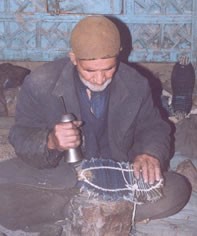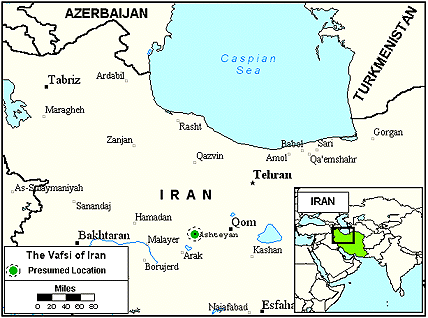In the mid-eleventh century, the Seljuk Turks conquered Iran under Togrul Beg. During the next four centuries, it was successively dominated by the Seljuks, the Mongols under Genghis Khan, Tamerlane and his Mongol hordes, and the Turkmen, resulting in a melting pot of ethnic groups, including the Vafsi people. The Vafsi compose a minute percentage of Iran's total population.
The origins of the Vafsi are unclear. However, they are closely related to the Astiani people, though the two groups have different languages.
More than half of Iran is rugged terrain or wasteland, most of which is uninhabitable salt deserts. About one-tenth of the country is suitable for farming, and another one-fourth is suitable for grazing. Nearly one-third of the agricultural land area is irrigated, mostly in the hilly margins between desert and mountains. It's in this environment that the Vafsi are trying to produce enough food for their needs. They continue to work as farmers and herdsmen.
Health conditions outside of Tehran are poor. Many small towns and rural areas suffer from unsanitary conditions and a shortage of medical personnel and facilities. As a result, health care needs are a challenge to the Vafsi people. Education is also a challenge. Iran's school system serves mainly to prepare a few students for university-level education.
One advantage the Vafsi people have over other small tribes in Iran is that they have 24 of their folktales recorded in their heart language. This provides a major head start for anyone who would want to translate the Bible into the Vafsi language.
Ethnic minorities like the Vafsi are sometimes perceived to hold greater allegiance to their individual ethnic groups than to Iranian government. Thus, the Vafsi and other minority tribes are usually Shia Muslim, but they look to the spirit world for help for their daily lives and practical needs.
The Vafsi people need better health care and schools. They also need the chance to hear about the Risen Savior, but there are still no Christian materials in their Vafsi language.
Pray for God to demonstrate his blessing—strengthening and healing families and communities within the Vafsi people so they will follow him.
Pray that God will send culturally-sensitive Christ followers who will show them the way to the cross.
Pray for a movement to Christ that will flourish among this people group.
Pray for the Vafsi people to be blessed with peace, joy and spiritual prosperity as they follow Jesus Christ.
Scripture Prayers for the Vafsi in Iran.
| Profile Source: Joshua Project |











